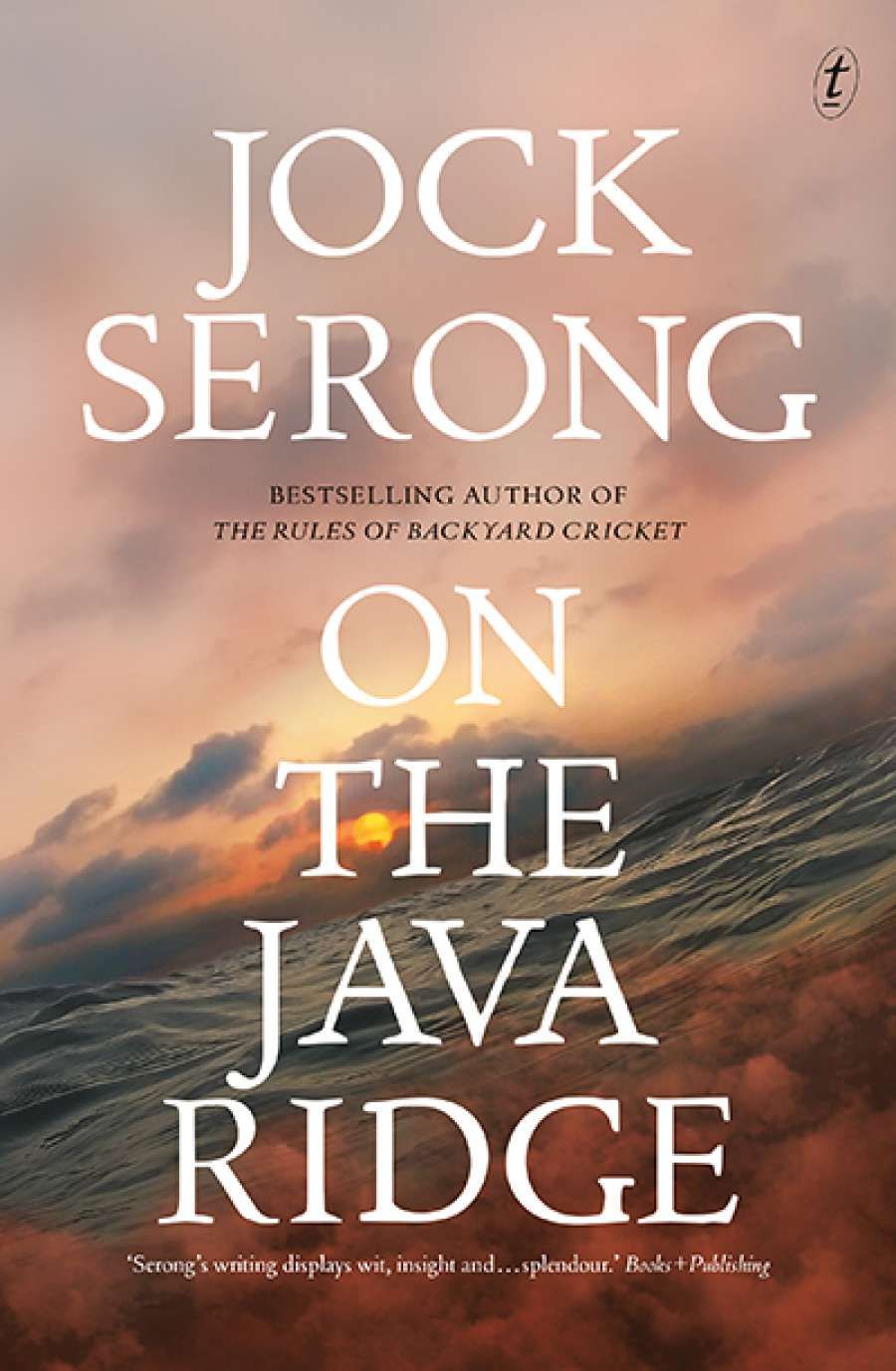
- Free Article: No
- Contents Category: Fiction
- Custom Article Title: Miriam Cosic reviews 'On the Java Ridge' by Jock Serong
- Review Article: Yes
- Online Only: No
- Custom Highlight Text:
A rich vein of political writing runs through Australian fiction. From the early days of socialist realism, through the anti-colonialism of both black and white writers, to tough explorations of identity politics today, we have struggled with concepts of justice and equality since Federation ...
- Book 1 Title: On the Java Ridge
- Book 1 Biblio: Text Publishing, $29.99 pb, 312 pp, 9781925498394
As the book opens, Calvert is holding a press conference. First, he announces that the Indonesian navy has agreed to vet all vessels leaving Indonesia so that Australia will know the status of every ship or boat entering its waters. Then he lobs a bombshell. Australia will no longer recognise maritime law and custom: the duty to rescue those in distress at sea. Although he is a Cabinet stalwart, expertly spinning the government’s line on immigration to Australia, Calvert, we soon discover, is disliked by his vulgarly aggressive prime minister, and is suffering increasingly from blinding headaches.
Natoli, a competent skipper and no pushover, is nonetheless struggling with bolshie clients, who take advantage of her male partner’s absence to push their own agendas. Her two Indonesian crew are calm and expert backup. Strangely, given his multicultural agenda, Serong doesn’t let the crew into the many mini decision-making discussions that ensue when disaster strikes. The boat carrying Roya and a polyglot mob of fellow refugees from across the Middle East is ploughing south, the smugglers ignoring existing Australian regulations and unaware of the draconian measures just put in place. We get to know some of them, mostly the men: the violent smuggler boss; the religious misogynists who push back against Roya’s intelligence and curiosity.
While the political aftermath of Calvert’s announcement unfolds in Canberra, and he is made increasingly uneasy by intel silence on the unnamed Indonesian boat heading for Australian waters, the two vessels are overtaken by a storm. Natoli puts into safe harbour on an uninhabited island before the bad weather arrives. The paying customers enjoy a spot of fishing and swimming while the water is still calm, before everyone hunkers down in tents on land. The Indonesian boat, heading for the same island, doesn’t make it in time. The chapter that describes the shipwreck is brief but terrifying. Serong uses straightforward description, and, by not interpreting the fear for the reader, manages to make it more immediate. In the next chapter, he veers back to Natoli.
The first sounds to reach her were the voices.
For a time – Isi couldn’t tell how long – the voices were merged in her dreams, irrational and ghostly. But now they were becoming real, taking form.
Cries.
They were cries. Male and female, deeper and higher in pitch, but frightened. Pleading. That was what woke her, dragged her mind from the fog. The rain was much heavier now, and the cries wove in and out of its roar.
Thus the three stories collide. Calvert’s headaches worsen, he is increasingly under the prime minister’s gun, and he begins to think the unthinkable about the elusive boat. Natoli organises a search for survivors among the floating bodies, and discovers unknown strengths and weaknesses among her passengers. Roya comes into her own as further drama ensues on the high seas. Calvert’s denouement comes as a genuine shock.
 Jock Serong
Jock Serong
Serong’s writing is compelling, despite some quirks. He doesn’t maintain an authorial voice across the chapters, for example, but changes tone with his characters: choppy and sweary for Calvert in Canberra, offbeat for Natoli, lyrical for Roya. It can be distracting at first, thwarting the suspension of disbelief that makes fiction immersive. By the time of the shipwreck, however, there is so much emotional investment in the characters and the unexpected swerves in the narrative are so inventive that the shifts in storytelling voice become irrelevant.
A feminist or a multiculturalist could nitpick. Why is Natoli disrespected in the way her partner wouldn’t be? Do those Pashtun men have to be portrayed as quite so misogynistic? But this is the way the world actually is. The prime minister is unreconstructedly appalling; his motivation could have done with some fleshing out. But as we know from real life, this generation of conservative Australian politicians, who uncharacteristically wear their religion on their sleeves, haven’t given Serong much in the way of political or moral argument to work with.


Comments powered by CComment